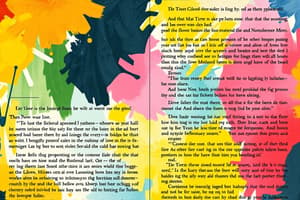Podcast
Questions and Answers
What is a key characteristic of academic language based on the text?
What is a key characteristic of academic language based on the text?
- Formal and sophisticated expressions (correct)
- Repetitive use of phrases
- Use of slang expressions
- Informal and casual tone
Which of the following is NOT a feature of academic language mentioned in the text?
Which of the following is NOT a feature of academic language mentioned in the text?
- Use of slang expressions (correct)
- Formal tone
- Variety of terms
- Objective based on facts and evidence
What should academic language be according to the text?
What should academic language be according to the text?
- Casual and conversational
- Influenced by personal feelings
- Based on facts and evidence (correct)
- Repetitive and informal
Which type of language is appropriate for written papers, classwork, and other academic purposes?
Which type of language is appropriate for written papers, classwork, and other academic purposes?
In academic language, sentences should preferably begin with:
In academic language, sentences should preferably begin with:
Which of the following terms is commonly used in social language but not in academic language?
Which of the following terms is commonly used in social language but not in academic language?
What is a major difference between social language and academic language?
What is a major difference between social language and academic language?
Which of the following best describes the tone of academic language?
Which of the following best describes the tone of academic language?
Which language style is characterized by phrases like 'you're hungry?' according to the text?
Which language style is characterized by phrases like 'you're hungry?' according to the text?
What type of expressions can be used in social language but not in academic language?
What type of expressions can be used in social language but not in academic language?
Which type of language should academic language particularly avoid?
Which type of language should academic language particularly avoid?
What is a key feature of academic language in terms of formality?
What is a key feature of academic language in terms of formality?
Which of the following terms is most likely to be found in social language rather than academic language?
Which of the following terms is most likely to be found in social language rather than academic language?
What is a crucial characteristic of academic language?
What is a crucial characteristic of academic language?
Which factor should academic language be based on?
Which factor should academic language be based on?
What kind of terms should be avoided in academic language according to the text?
What kind of terms should be avoided in academic language according to the text?
Which of the following is NOT a characteristic of academic language?
Which of the following is NOT a characteristic of academic language?
In academic language, what type of expressions are commonly used?
In academic language, what type of expressions are commonly used?
Study Notes
Purposes in Reading an Academic Text
- Locate main ideas to understand central concepts.
- Scan for specific information relevant to research.
- Identify gaps in existing studies for further investigation.
- Connect new concepts with previously established ideas.
- Acquire additional information to enrich understanding.
- Support writing assignments with credible evidence.
- Achieve a deeper comprehension of established ideas.
Factors to Consider in Writing Academic Texts
- Formulate critical questions and address key issues.
- Base arguments on verified facts and evidence from credible sources.
- Employ precise and accurate word choice while minimizing jargon.
- Maintain an objective perspective to ensure neutrality.
- Provide a comprehensive list of references for sourced materials.
- Utilize cautious language to reflect uncertainties in claims.
Academic Language
- Academic language is essential for success in educational settings.
- Encompasses discipline-specific vocabulary, nuances in grammar, and punctuation.
- Involves rhetorical conventions and devices typical of academic writing (e.g., essays, lab reports).
- Proficiency in academic language correlates with better academic and professional outcomes.
- Distinct from social language, which facilitates casual conversations in daily life.
Thesis-Driven Approach
- Starts with a clear perspective, idea, or position regarding the research topic.
- Aims to establish, prove, or disprove solutions related to posed questions.
Features of Academic Texts
- Complex: Employs varied vocabulary; includes longer and more complex sentence structures.
- Formal: Avoids colloquial expressions and informal language.
- Precise: Ensures facts are represented accurately and clearly.
- Objective: Focuses on imparting information with minimal bias; emphasizes nouns over adjectives.
- Explicit: Clarifies relationships among different parts of the text for reader comprehension.
- Accurate: Uses vocabulary with specific meanings pertinent to the subject matter.
- Hedging: Adjusts claims to reflect varying degrees of certainty regarding topics.
- Responsible: Requires evidence and justification for all claims made, ensuring accountability.
- Organized: Streamlines ideas logically, enhancing the flow from section to section.
- Planned: Developed after thorough research and evaluation, adhering to specific objectives and plans.
Studying That Suits You
Use AI to generate personalized quizzes and flashcards to suit your learning preferences.
Description
Explore the factors to consider in writing an academic text, including purposes such as locating main ideas, scanning for information, and connecting new ideas to existing ones. This quiz is based on the module 'English for Academic and Professional Purposes'



